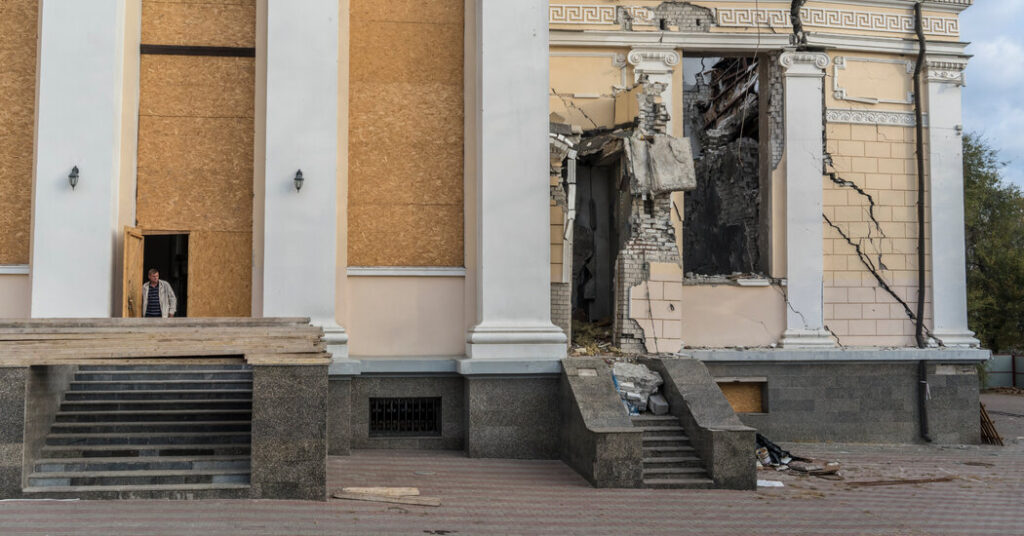A Ukrainian official who has long been an anti-corruption advocate resigned on Monday from the government agency overseeing Ukraine’s largely Western-funded reconstruction effort, citing mismanagement of funds. His departure highlights tensions within President Volodymyr Zelensky’s government over the distribution of wartime aid.
The official, Mustafa Nayyem, a former director of Ukraine’s state recovery agency, did not accuse him of any blatant corruption. But his accusations of abuse and mismanagement could stymie the administration’s efforts to assuage U.S. and other allies’ concerns about providing billions of dollars in aid to the war in Ukraine.
He is the second senior official involved in Ukraine’s reconstruction efforts to leave last month, following the dismissal of Infrastructure Minister Oleksandr Kubrakov in May. The department headed by Kubrakov oversees the agency headed by Nayem.
Kubrakov is seen in Kyiv political circles as someone aligned with the United States on reconstruction aid spending priorities — a stance that has angered other government leaders who resent intrusive U.S. oversight. Both he and Mr Nayem have spoken out against bribery in the construction industry.
The Ukraine Recovery Agency was established during the war to streamline and secure reconstruction funding and is expected to eventually attract tens of billions of dollars in foreign aid given the scale of destruction during the war. Ukraine and some allies are pushing to seize Russian assets to fund the effort.
Preventing abuse has been a top priority for U.S. policymakers and was a concern raised by members of Congress during debates on a $61 billion military and financial aid package earlier this year. The plan was finally approved in late April.
Nayem’s reconstruction agency oversaw a budget of 100 billion hryvnia (Ukrainian currency) last year, about $2.5 billion, and like most of Ukraine’s non-military spending, much of it came from foreign aid.
Its projects range widely. The agency funds the construction of physical barriers to protect the power plant’s fragile electrical equipment in the event air defense systems fail to protect the site. The agency repaired water pipes, bridges and roads.
Nayem did not mention specific cases of corruption in a phone interview and in a letter posted on Facebook explaining his resignation. Instead, he laid out what he claimed was a series of bureaucratic hurdles that hampered the agency’s work and delayed project approvals and contractor payments. He said agency staff had their salaries cut, which he called an effort to undermine the organization’s work.
“Since November, the agency’s team has faced constant confrontation, resistance and artificial obstacles,” he wrote in a Facebook post.
Zelensky’s office did not immediately respond to inquiries about the resignation or allegations of mismanagement by Nayem.
Mr. Nayem said that despite the setbacks, most projects were completed.
Last fall, Nayem reported two members of Congress to anti-corruption agencies, accusing them of trying to pay bribes. The cases are now in court.
Even before the war, foreign aid had been a fraught issue in Ukraine for years, with Ukrainian leaders resisting Western efforts to use aid to guide personnel policy or support government reforms that threatened vested interests.
Nayem said the bureaucratic delays appeared to be designed to crowd out the work of reconstruction agencies.
“Transparency and predictability on this issue are critical because the funding comes from taxpayers,” Nayem said in an interview. “The greatest asset we have now is trust. At this moment, those who are trying to make this system transparent and accountable have to leave.
Najem’s resignation came at an awkward time, coming just a day before a major donors’ conference for Berlin’s reconstruction. Ukrainian authorities excluded him from the delegation, disrupting what he said was a scheduled meeting with foreign officials about donations for Ukraine’s reconstruction.
By Monday evening, Nayem and the government were publicly divided over the reasons for his exclusion from the delegation. Government officials told Ukrainian media that the prime minister had scheduled a meeting with Mr. Nayem on Wednesday, but Mr. Nayem said he had never received such an invitation.
Nayem said in an interview that contractors had not been paid for months despite an urgent need to repair power plants, roads, bridges and water systems damaged by Russian missile strikes. Some projects are stuck due to non-payment, he said.
The agency financed a number of military fortifications in the Sumy region of northeastern Ukraine and the Donetsk region of eastern Ukraine. In a letter explaining his resignation, Nayem wrote that payments on these and other contracts had been “delayed for months.”
“All of this has had a negative impact on the country’s defense capabilities,” he wrote.
Completed projects include the construction of protective barriers around electrical equipment at 103 locations to protect machinery from shrapnel damage, he said. He said the barriers helped protect three areas from missile attacks and allowed engineers to restore power more quickly.
Former Ukraine Economy Minister Timofey Milovanov said some setbacks were inevitable given the confusion over government permits needed to repair war damage and deals with construction companies. “This is a wartime environment, so not everything goes smoothly. You’re always solving problems.

